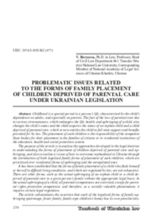Abstract.
Childhood is a special period in a person’s life, characterized by the child’s dependence on adults, and especially on parents. The fact of the loss of parental care due to various circumstances, which endangers the life, health, and upbringing of a child, also changes the child’s status and the child acquires the status of an orphan child and a child deprived of parental care, which in turn entitles the child to full state support and benefits provided for by law. The placement of such children is the responsibility of the competent State bodies for their placement in the families of citizens or in residential institutions of the education, health and social protection system.
The purpose of the article is to analyze the approaches developed in the legal doctrine to understanding the forms of placement of children deprived of parental care and upbringing, and also to outline a vision of how to overcome orphanhood in Ukraine through the introduction of both legalized family forms of placement of such children, which are prioritized over residential forms of upbringing and the unregulated ones.
It has been established that the forms of family placement of a child who finds himself or herself in difficult living conditions, and which are regulated by law, are not exhaustive. There are other forms, such as the actual upbringing of an orphan child or a child deprived of parental care in a given person’s family without the appropriate legal basis. In the actual upbringing of a child, all parental competences are exercised, except for parental rights protection competence, and therefore, as a socially valuable phenomenon, it requires certain legal regulation.
The article substantiates the assertion that each of the legalized forms of family upbringing (patronage, foster family, family-type children’s home) has its own peculiarities, but unifies them by the fact that one of the elements of the actual structure of their emergence is the corresponding agreement: on patronage; on the placement of children in a foster family for upbringing and joint residence; on the organization of the activities of a family-type children’s home. These agreements are part of the group of family legal agreements on social assistance for children in difficult circumstances due to orphanhood, homelessness, conflicts, domestic abuse, etc. The purpose of these agreements is to overcome the difficult life circumstances in which a child, parents or legal representatives have been involved by means of social assistance, e.g. by giving consent for patronage. Although these agreements do not constitute legal facts in their own right that give rise to the respective legal relations, when determining the legal nature of these agreements, one should take into account the specifics of the agreement as a legal fact, which is formed under the influence of the relations that they mediate.

